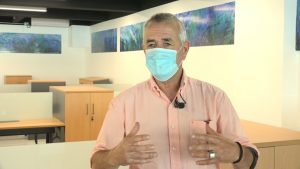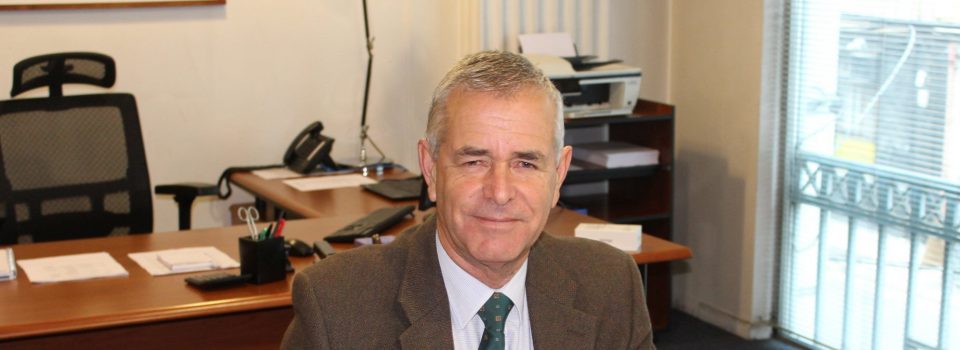“IFOP is a source of pride for Chile and it is necessary that its work in defense of aquaculture resources and environment be known”
August 31st, 2020 Luis Parot explains that Fishing Development Institute (IFOP) is the applied research institution that has the largest territorial presence and advanced human capital to carry out environmental monitoring of aquaculture industry and research climatic change impacts on the whole ecosystem.
Luis Parot explains that Fishing Development Institute (IFOP) is the applied research institution that has the largest territorial presence and advanced human capital to carry out environmental monitoring of aquaculture industry and research climatic change impacts on the whole ecosystem.
-What IFOP aims for ?
– Fishing and aquaculture applied research. It generates public value knowledge, so that sectorial institutions (Subpesca) take administrative and regulatory measures for fishing and aquaculture. In short, our task is to protect resources and marine and freshwater environment, which are impacted by these human activities.
-How has the pandemic affected you?
-We have almost 200 scientific observers from Arica to Puerto Williams, taking hydrobiological and oceanographic data in coves, ports and aboard industrial and artisanal fishing vessels. That task has been affected by quarantines, travel controls and the general decline in activity that occurred during the first months. Even so, we will reach 75% of the activity of a normal year by year-end.
-How does this situation affect IFOP advice given to Subpesca?
-In general, the models we use to build up this consultancy use historical data. Thus, they do not react immediately to a lack of data or exceptionally good data in a season, since in order to change the trend, several years of trend-setting data are required. The natural dialogue that exists within the Scientific-Technical Committees (CCT), which are the place for scientific discussion and analysis, is a very good tool to ensure that advice is maintained at a level of excellence.
-How does IFOP sees fisheries resources and aquaculture status ?
-Current Fisheries Law established what it aptly calls a “precautionary approach” that should inspire decisions on these matters. Recognizing that there is always uncertainty in forecasts, he decides to take the most conservative decision: protect resources. As long as all actors in fisheries understand and abide by the rules and their inspiring principles, we can increase fish yields in the medium term. Today, we have almost all of the resources in full or overexploitation, but considering remained biomass after overfishing to which they were subjected during the 90s. Recovering the fishing biomass to its pre-crisis level would be a very good first step.
– Does illegal fishing affect?
-Of course! Starting from generating a hidden catch figure that is one of the data considered in the models, to irreparable damage to work transparency and formality in the fishing sector, especially the artisanal sector and in the distribution chain. When these mafias are created, all the activity is invaded by corruption in the whole column and variety of actors.
-What about aquaculture and its environmental impacts?
-Aquaculture has made an enormous contribution to the country’s development and especially to the South Austral zone, but clearly and it still happens in other economy sectors, we do not have a proactive State that guides and accompanies private sector in its initiatives. We are paying very dearly for this lack of a foresighted and regulatory state, and it explains the resistance of groups and communities that are very opposed to the aquaculture industry, based mainly on its environmental impacts. But that can be remedied with high-level research, with environmental monitoring in the areas involved and with the more proactive and participatory management of an industry in constant expansion and technological evolution.
-How IFOP relates to aquaculture?
-IFOP has 228 environmental monitoring stations in inland waters between south of Los Ríos Region to Beagle Channel, plus 79 stations in the Pacific from Coliumo to the northern sector of Aysén Region, all of them for tidal monitoring red. We do modeling of currents and tides in inland sea of Chiloé and Aysén, the results of which can be seen at http://chonos.ifop.cl/, a useful predictor to know how particles move in fjords and channels area. In addition to environmental monitoring, we do biological sampling throughout the area to detect toxins in mollusks also associated with red tide, we do research in animal health and small-scale aquaculture. IFOP has a strong presence in southern zone with its centers in Puerto Montt, Chiloé (Ancud, Putemún and Hueihue), Aysén and Punta Arenas.
In sum, IFOP is the research institution with the largest territorial presence and advanced human capital to carry out environmental monitoring of the aquaculture industry and study of climate change’s impact on the entire ecosystem.
-It seems that climatic change was a postponed concern due to the pandemic …
– It is probable, but for that reason it is not less urgent. Climatic change affects ecosystems crucial variables, causing changes in the species behavior or replacing them by others. In fjords and channels case, temperature increase will increase fresh water contribution and will bring changes in currents and tides and will bring effects on biological processes. Investigating these phenomena intensely and in a timely manner, allows us to know them and anticipate their effects.
-Is IFOP prepared for this task?
-IFOP was created by Corfo 56 years ago, in which it has built a solid tradition that is reinforced today by its 170 high-level researchers, many of them internationally recognized. We have established relationships with main research centers in the world, clear high-level improvement policies, we are peer-reviewed in our models and processes, part of our data program is already under the ISO 9001 standard and we are determined to win a relevant space in the discussion of subjects in which we have specialized. IFOP, for example, carried out the first Krill fishing campaigns in Antarctica, therefore, any new fisheries research initiative that wants to develop there should consider IFOP in its role, recognized in the law, as an advisor to the State. in fishing and aquaculture.
-But are there other topics that interest you?
-Of course; Until a few months ago and around the CC, initiatives were known that showed a lack of basic information. As IFOP, we approached to speak with the Ministry of Sciences to tell them what we do and what infrastructure and data we have and, from that first opportunity, a very useful working relationship was generated; The same goes for the Environment and Foreign Ministry, which IFOP can support with information, management, professional support and high-level research and favor the work of the country involved in its important decisions.
-What challenges does IFOP face today?
-The first is high-level training for its researchers and all our processes ISO certification. The second is to have a good time, with a very collaborative internal work, this time of restrictions imposed by the pandemic. And of course our flagship project which is to build a new Aquaculture Division headquarters based in Puerto Montt. We are very hopeful to get support to start work soon
-Even with pandemic restrictions?
-Yes. We have the land, we are about to obtain the building permits and it is a project with many positive externalities: science and research; in fishing and aquaculture, two very significant activities for Chile; it strengthens the scientific capacities and the character of leaders of Los Lagos and Aysén regions, has an affordable budget of 5 million dollars equipped and can be executed in 18 months.
My effort aims at ensuring that its construction is included in the economic reactivation program promoted by President Sebastián Piñera’s government . We already have the Mayor support, Corfo, Economy Ministry, and Housing Development Ministry and I hope to have Ministry of Public Development support, Alfredo Moreno. If all goes well, we can start construction in the first quarter of 2021.
“I am especially confident in the President’ssupport, because he demonstrated it by supporting the construction of two scientific research vessels,” he asserts.
Source: La Segunda newspaper / IFOP press
